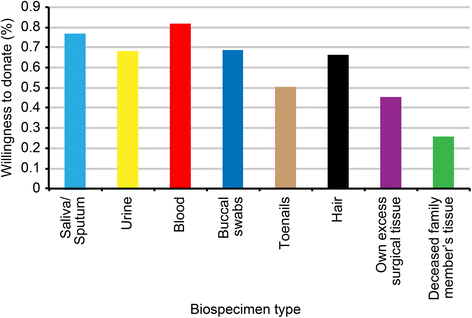Assessment of knowledge about biobanking among healthcare students and their willingness to donate biospecimens
- PMID: 28464877
- PMCID: PMC5414189
- DOI: 10.1186/s12910-017-0195-8
Assessment of knowledge about biobanking among healthcare students and their willingness to donate biospecimens
Abstract
Background: Biobanks and biospecimen collections are becoming a primary means of delivering personalized diagnostics and tailoring individualized therapeutics. This shift towards precision medicine (PM) requires interactions among a variety of stakeholders, including the public, patients, healthcare providers, government, and donors. Very few studies have investigated the role of healthcare students in biobanking and biospecimen donations. The main aims of this study were (1) to evaluate the knowledge of senior healthcare students about biobanks and (2) to assess the students' willingness to donate biospecimens and the factors influencing their attitudes.
Methods: A cross-sectional study was conducted among senior healthcare students at King Abdulaziz University (KAU), Saudi Arabia. The data were obtained using a self-administered questionnaire in English. In addition to the respondents' biographical data section, the questionnaire assessed the respondents' general knowledge about biobanking, the factors influencing their willingness to donate biospecimens to biobanks and their general attitudes towards biomedical research.
Results: A total of 597 senior healthcare students were included in the study. The general knowledge score was 3.2 (±1.6) out of 7. Only approximately 44% and 27% of students were aware of the terms "Human Genome Project" (HGP) and "biobank," respectively. The majority of the students (89%) were willing to donate biospecimens to biobanks. Multiple factors were significantly associated with their willingness to donate, including their perceived general health (p < 0.001), past experience with both tissue testing (p < 0.04) and tissue donation (p < 0.001), biobanking knowledge score (p < 0.001) and biomedical research attitude score (p < 0.001). The main reasons for students' willingness to donate were advancement of medical research and societal benefits, whereas misuse of biospecimens and confidentiality breaches were the main reasons for a reluctance to donate.
Conclusion: Despite their strong willingness to donate biospecimens, students exhibited a notable lack of knowledge about biobanking and the HGP. To expedite the transition towards PM, it is highly recommended to enhance healthcare curricula by including more educational and awareness programmes to familiarize students with OMICs technologies in addition to the scope of research and clinical applications.
Keywords: Biobank; Biospecimens; Knowledge; Medical students; Precision medicine; Survey; Willingness to donate.
Figures
Similar articles
-
Assessment of Biobanking Knowledge and Attitudes towards Biospecimen Donation among Healthcare Providers in Saudi Arabia.Int J Environ Res Public Health. 2022 Sep 20;19(19):11872. doi: 10.3390/ijerph191911872. Int J Environ Res Public Health. 2022. PMID: 36231176 Free PMC article.
-
Assessment of willingness of Saudi public to participate in a dental biorepository for research purposes.BMC Oral Health. 2023 Feb 7;23(1):80. doi: 10.1186/s12903-023-02775-9. BMC Oral Health. 2023. PMID: 36750847 Free PMC article.
-
To donate or not to donate? Future healthcare professionals' opinions on biobanking of human biological material for research purposes.BMC Med Ethics. 2023 Jul 22;24(1):53. doi: 10.1186/s12910-023-00930-z. BMC Med Ethics. 2023. PMID: 37481540 Free PMC article.
-
Public Attitudes toward Biobanking of Human Biological Material for Research Purposes: A Literature Review.Int J Environ Res Public Health. 2019 Jun 21;16(12):2209. doi: 10.3390/ijerph16122209. Int J Environ Res Public Health. 2019. PMID: 31234457 Free PMC article. Review.
-
The role of biobanks in elucidating prevalent genetic diseases in Saudi Arabia.Drug Discov Ther. 2016;10(4):226-33. doi: 10.5582/ddt.2016.01044. Drug Discov Ther. 2016. PMID: 27594298 Review.
Cited by
-
Study of laboratory staff' knowledge of biobanking in Côte d'Ivoire.BMC Med Ethics. 2020 Sep 11;21(1):88. doi: 10.1186/s12910-020-00533-y. BMC Med Ethics. 2020. PMID: 32917182 Free PMC article.
-
Views of university students in Jordan towards Biobanking.BMC Med Ethics. 2021 Nov 13;22(1):152. doi: 10.1186/s12910-021-00719-y. BMC Med Ethics. 2021. PMID: 34774033 Free PMC article.
-
Associations between the Willingness to Donate Samples to Biobanks and Selected Psychological Variables.Int J Environ Res Public Health. 2022 Feb 23;19(5):2552. doi: 10.3390/ijerph19052552. Int J Environ Res Public Health. 2022. PMID: 35270246 Free PMC article.
-
Public's awareness of biobanks and willingness to participate in biobanking: the moderating role of social value orientation.J Community Genet. 2023 Jun;14(3):275-285. doi: 10.1007/s12687-023-00634-2. Epub 2023 Jan 20. J Community Genet. 2023. PMID: 36662375 Free PMC article.
-
Knowledge and Willingness for Organ Donation in the Middle Eastern Region: A Meta-analysis.J Relig Health. 2020 Aug;59(4):1810-1823. doi: 10.1007/s10943-019-00883-x. J Relig Health. 2020. PMID: 31309441 Free PMC article.
References
-
- Christodoulou J. The human genome project: opportunities, challenges and consequences for population screening. Southeast Asian J Trop Med Public Health. 2003;34(Suppl 3):234–238. - PubMed
MeSH terms
LinkOut - more resources
Full Text Sources
Other Literature Sources
Miscellaneous


